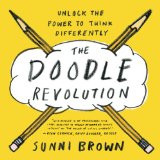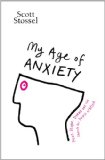new book – ‘The Doodle Revolution: Unlock the Power to Think Differently’ by Sunni Brown
January 19, 2014
The Doodle Revolution: Unlock the Power to Think Differently by Sunni Brown (Portfolio/Penguin, 2014)
Book description from the publisher:
There is NO SUCH THING as a mindless doodle
What did Einstein, JFK, Edison, Marie Curie, and Henry Ford have in common? They were all inveterate doodlers. These powerhouse minds knew instinctively that doodling is deep thinking in disguise—a simple, accessible, and dynamite tool for innovating and solving even the stickiest problems.Sunni Brown’s mission is to bring the power of the Doodle to the rest of us. She leads the Revolution defying all those parents, teachers, and bosses who say Stop doodling! Get serious! Grow up! She overturns misinformation about doodling, demystifies visual thinking, and shows us the power of applying our innate visual literacy.Doodling has led to countless breakthroughs in science, technology, medicine, architecture, literature, and art. And as Brown proves in this inspiring, empowering book, it can help all of us think and do better in whatever fields we pursue.With passion and wit, Brown guides you from the basic Doodle all the way to the formidable “Infodoodle”—the tight integration of words, numbers, images, and shapes that craft and display higher-level thinking.She’ll teach you how to doodle any object, concept, or system imaginable.She’ll show you how to shift habitual thinking patterns to get cognitive breakthroughs.She’ll help you transform boring text into displays that can engage any audience.And she’ll give you the courage to take up your pen, pencil, or whiteboard marker, without shame, judgment, or apology.As Brown writes in the Doodle Revolutionary’s Manifesto, “No longer will the Doodle live in a house of ill repute. No longer will simple visual language be underestimated, underused, and misunderstood. Forevermore, we acknowledge the Doodle as a tool for immersive learning and we wield its power deliberately and without restriction, in any learning environment we see fit.”Doodlers of the world, unite! The power of the pen awaits you.
Google Books preview:
See also: Author’s website








